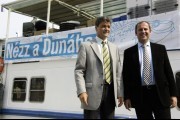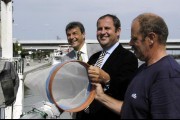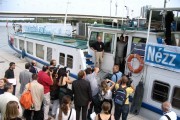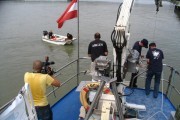
Press Conference
"The expedition is very rich in new data," said JDS2 Core Team Leader Béla Csányi. "We're finding animals never found before. One reason is because we can make samples as deep as eight metres from the boat without using divers - also a first."
Csányi's audience was a group of journalists attending a JDS2 press conference held at the Riverside Restaurant this morning. The venue was located in downtown Vienna along the Danube, near to UNO City - home to the offices of the ICPDR Secretariat. Speakers included Austrian Minister for Environment Josef Pröll, ICPDR Executive Secretary Philip Weller and Béla Csányi.
"The Joint Danube Survey will show the status of the quality of the Danube River. Austria spent a lot of money in sewage plants etc. to get the river clean. We already know that the Danube is much cleaner than other big rivers. So we are looking forward to the results at the end of the survey and hope that a good status for the Danube can be documented."
Journalists were interested about the situation on board the ships and what if any results had come in so far. Some discussion revolved around the high nitrate values measured upstream - it was noted, however, that heavy rains pushing more sewage into the river could have been the cause.
(See Austrian press release in German)
From back pains to muesli
After the round of questions and answers, the press boarded the Argus for a short Danube ride with sampling demonstrations and interviews. It was also a chance to collect some personal reflections from the team about the expedition so far (for this JDS2 Logbook).
"When I have a moment, I just collapse," said Csányi. "Everybody's tired. Many of us work until midnight every day. It's not a complaint, just reality. And my back hurts from standing so much and packing samples."
Csányi added that one of the biggest problems since the expedition started was that the scientists didn't know exactly where their equipment was. Materials had been earlier loaded onto the ships days before the launch (see Diary August 7) in Budapest, Bratislava and Vienna, without the scientists. The original plan was for the scientists to locate their equipment on the two ships once they were together in Regensburg, Germany. But that didn't happen because heavy rains had earlier grounded the Széchényi in Deggendorf (see Diary August 11). As the sampling proceeded after Regensburg, the scientists had a tough time finding their equipment "hidden" beneath the ship's decks. "But now we know where everything is and our work is getting better and better every day."
Jovica Golubovic, the Serbian Captain of the Argus, said that he really appreciated the excellent navigational aids on the Upper Danube such as the lamps, buoys, signs and GPS positioning capabilities. As for his relations with the scientists so far: "Super, no problem," he said.
"The working situation in the laboratory has been difficult at times," said Austrian biologist Christine Kaiblinger. "At first, our chairs weren't adjustable so many of us looked like giraffes stretching our necks to be able to look down the equipment. Now we have new seats that we can adjust." She added that laptops have given some surprises. And the air-conditioning in some areas was too cold. "So while we worked with smelly chemicals and samples, we also froze and caught colds." The lack of sleep also hasn't helped. Christine then opens the door of a small fridge under the lab counter to show me some Austrian survival aids - muesli, yogurt and chocolate!


















